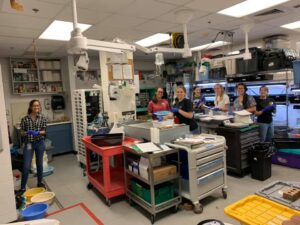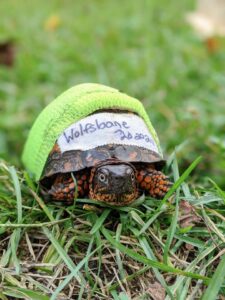Introduction to the Course
Module Goals
- Learn about the purpose of the Turtle Ally Certification Program
- Learn about the Turtle Rescue Team as an organization
- Discover how the TACP online modules are structured
If you would like to listen to an audio recording of this module, please click here. (Duration: 8:03)
Background

Welcome to the Turtle Ally Certification Program (TACP), which is run in association with the Turtle Rescue Team (TRT).
The TRT was started in 1996 by Dr. Gregory Lewbart, a professor of aquatic animal medicine at the North Carolina State University College of Veterinary Medicine. Veterinary students work together with interns and residents, faculty, undergraduates, wildlife rehabilitators, and members of the public to care for wild turtles, as well as the occasional snake or amphibian. Since its initiation, TRT has treated thousands of turtles, sometimes more than 500 in a year.
At the onset of the major shutdowns due to the SARS-CoV-2 outbreak in North Carolina in 2020, veterinary students were not permitted on campus from March until late June. Hospital admissions of turtles were reduced to a maximum of 10 patients at a time, with only faculty, residents, and interns able to come in and provide medical care. The intake limit remained in place once students were permitted to return to campus. Hundreds of calls were received by TRT about injured turtles that needed to be turned away due to COVID-19-related restrictions. During this time, it became apparent that there was a need for veterinarians who were willing and able to see injured turtles in their private practices, especially in more rural parts of the state. The TRT leadership team realized that having a network of veterinarians across the state who could help triage turtles and provide basic medical care would be a beneficial asset during a state of emergency or for turtles who are found more than an hour away and cannot be transported to the TRT in Raleigh.
Goals of the TACP
- Increase access to care for wild turtles across the state of NC
- Relieve members of the public (“Finders”) from having to drive for hours to reach the TRT with a turtle that has mild injuries or who just needs to be euthanized
- Promote networking and positive cooperation between veterinary students of the TRT and professional licensed veterinarians in the state of North Carolina
- Provide continuing education to North Carolina veterinarians in the area of wildlife medicine
Role of the Veterinarian as a Turtle Ally
 As a private practice veterinarian, you play an important role in your community as a bridge between people and the animals they care about. Most of the time, this description is referring to companion animals. It can also refer to our native wildlife – there are so many good Samaritans in North Carolina who truly care about their wild neighbors and want to do everything they can to help them. This is especially true of turtles – people love turtles. At TRT, we have had people drive over three hours just to get turtles to us, and we get hundreds of calls from people who just want to know more about turtles and how to protect them. While we try to take in as many turtles as we can, sometimes a turtle just can’t get to us due to factors like distance, weather, or states of emergency. This is where certified Turtle Ally veterinarians play an important role.
As a private practice veterinarian, you play an important role in your community as a bridge between people and the animals they care about. Most of the time, this description is referring to companion animals. It can also refer to our native wildlife – there are so many good Samaritans in North Carolina who truly care about their wild neighbors and want to do everything they can to help them. This is especially true of turtles – people love turtles. At TRT, we have had people drive over three hours just to get turtles to us, and we get hundreds of calls from people who just want to know more about turtles and how to protect them. While we try to take in as many turtles as we can, sometimes a turtle just can’t get to us due to factors like distance, weather, or states of emergency. This is where certified Turtle Ally veterinarians play an important role.
Upon completion of this program, your role within the Turtle Ally network includes:
- Triage and basic treatment of turtles that present to your clinic with mild injuries
- Supportive care for turtles with moderate to severe injuries prior to transport to TRT
- Euthanasia of turtles with poor prognosis
- Providing information to clients about what to do if they find a turtle
The specifics of your role as a Turtle Ally depend largely on your practice. We do not expect certified Turtle Allies to become full-time wildlife veterinarians, but rather to take on the occasional wild turtle patient. Luckily, turtles generally do not need the same level of intensive care that can be required of wild mammals and birds. The information provided by the TACP will allow you to provide basic emergency services to injured turtles. For more advanced care, we recommend referral or consultation with TRT.
How the TACP can benefit you
Even if you love turtles, you may be wondering, “Why should I use my time and my clinic’s resources to participate as a Turtle Ally veterinarian?” Here are some of the benefits you can expect from the TACP:
- Experience in the treatment of several species of native turtles
- Access to reptile medicine resources through TRT for as long as you retain your certification
- Reputation – someone who brings a turtle to you could become a future client for their own pets
- Collaboration with members of the NCSU CVM as well as other veterinarians in the Turtle Ally network
- NC CE credit
- The joy that comes with helping a wild turtle in need
Course Organization
Within this website, you have access to all the online modules for the TACP. To navigate through the modules, you can use the menu at the top of the site to click on “Access Modules,” or you can use the buttons within the modules that look like this:
Table of ContentsThe “Table of Contents” button returns you to the list of modules.
Previous Module Next ModuleThe “Previous Module” or “Next Module” buttons will allow you to navigate between modules in order.
At the top of each module, you will see a box that outlines the Module Goals – this will help you know what to focus on. Similarly, there will be another box at the bottom of each module that lists the Key Concepts to help you reinforce what you learned. Finally, at the bottom of each module you will see a button that looks like this:
Test your Knowledge!Clicking this button will open a new tab where you have an opportunity to answer a few multiple choice questions about the information presented in that module. You must correctly answer 40 of the 50 multiple choice questions to receive CE credit for the online modules – you can take the quizzes as many times as you like.
Each module will also list “Relevant Videos” which will hold links to videos from the TRT Video Training Library that are associated with that module. You will also find “Additional Resources,” which provide links to other sites, articles, or book chapters that will be useful to you as you work with turtles.
Finally, there is a link at the top of each module, under the “Module Goals,” that leads to an audio recording of the information to accommodate different learning styles.
As a member of the TACP network, you will be on an email list that will update you whenever there are changes to the website. New research on turtle medicine is always moving forward, and we will do our best to keep this information up to date with the best practices and techniques.
Access to the resources provided in the modules is a benefit of the TACP program – please do not distribute any of this information outside of the TACP network without permission from the Turtle Rescue Team.
Congratulations – you’ve made it through your first module! There is no quiz for this one.
Additional Resources
- Contact information for the Turtle Rescue Team: turtle-rescue-team@ncsu.edu
- Rehabilitation Coordinators: turtlerehabcoordinator@gmail.com
- On-Call Student Pager (8 am-8 pm, 7 days/week): (919) 397-9675
Key Concepts
- The TACP was designed to increase the network of veterinarians in NC who can provide emergency care to injured turtles
- Certified Turtle Ally veterinarians will benefit from the TACP with experience, learning resources, and engagement with the public
- Several resources such as quizzes, videos, and additional reading are provided throughout the modules
